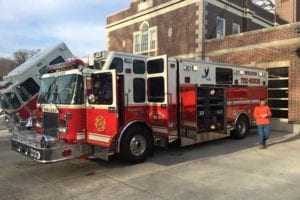Challenges for Maintaining Apparatus and Equipment in Volunteer Fire Departments
By Frank R. Myers
Volunteer fire departments can be especially vulnerable to equipment failures caused by incomplete inspections and/or repair failures—and their reputations can be damaged in the process. A report on KUTV notes, “Fire trucks failed to start in emergencies before Sunset volunteer department was closed… When a fire torched the home of Sunset, Utah, residents in February, the news spread quickly through town…When the department was in operation, the volunteer firefighters reported having consistent trouble with their equipment.” How can fire departments best guard against these failures?
Volunteer departments are the backbone of this country. According to the NFPA, about 70 percent of America’s firefighters are volunteers, and 85 percent of the nation’s fire departments are all or mostly volunteer. The smallest communities—those with fewer than 10,000 residents—are almost always served by volunteer departments.
Daily inspections of the community’s apparatus for some volunteer department does not occur. Therefore, any mechanical or equipment issues may not be caught in a relatively short time frame. Assuming most volunteers do their duties on the weekends, what facilities are open to correct for any repairs needed? Are these facilities qualified to perform needed repairs on emergency vehicles or is the department dependent on its members to provide the labor? Are they certified EVT facilities? What resources are available for the apparatus and equipment?
These are all good questions, and each department functions differently. Granted, they may or may not have the same resources available to them as paid fire departments in larger municipalities. They also need to have the same standards in place or a way to assure that the equipment and apparatus are ready for any needed emergency.
The last thing that is needed is to use a substandard part or make an inadequate repair to keep the tool or truck running—a potential precursor to a component failure in a time of need. Small departments, in particular, don’t generally have enough funding for substantial legal fees or restitution.


Following a regular schedule assures that training, inspection, and exercising of gear and equipment has taken place. “If it was not documented, it never happened” is the familiar saying we all have heard many times.
Most of these requirements can be found in NFPA 1911 and 1901 on the following links:
- https://submittalsarchive.nfpa.org/TerraViewWeb/ViewerPage.jsp?id=1911-2012.ditamap&pubStatus=FDR
- https://submittalsarchive.nfpa.org/TerraViewWeb/ViewerPage.jsp?id=1901-2009.ditamap&pubStatus=FDR
While many career firefighters use their skills on a regular basis to stay proficient, volunteers with less frequent calls need to be proactive about practicing their necessary tasks to stay sharp and focused.
One of the best things going for volunteer departments with today’s advancements is readily available documentation to facilitate access to required maintenance and inspections. This is vital since there are not full-time personnel manning the stations or administrative offices. Giving a lead person the authority to have access to the required reports at any time, without having to drive and go to a file cabinet somewhere for any piece of equipment or apparatus, goes a long way toward staying up to speed.
Getting checks done through digital technology, cloud storage, etc., and forwarding information to the required people can happen rapidly. This is a tremendous, valuable way to assure that things are getting done. Plus, full accountability is available immediately when a status of readiness report and documentation are requested.
Many times, the volunteer equipment is not used as often as career departments. This can be good because everything stays newer. But, sitting and not being exercised can lead to performance deficiencies. Just as with career departments, regular checks will catch any malfunctions or breakdowns immediately. Having backup replacements can solve some of these issues—but for volunteer departments, this can be too costly.
There is no doubt that volunteer firefighters get the required training for their Certificate of Compliance first, but that is only the beginning. Knowledge, skills, and expertise are mostly gained from experience and on-the-job training. Their calling and passion to become volunteers can help drive ongoing top-notch performance of their departments’ and equipment. Our hats are off to them for their dedication.
FRANK R. MYERS is a retired Lieutenant with the City of Miami (FL) Fire Rescue, where he served 32 years. Before his retirement, he served at the Training Center for six years as the Driver Engineer Instructor. Frank now serves as a Senior Advisor for pstrax.com, a software platform that helps fire departments streamline and automate their apparatus, equipment, and narcotics programs. Frank Myers can be reached directly at [email protected] or 305-804-5177.
